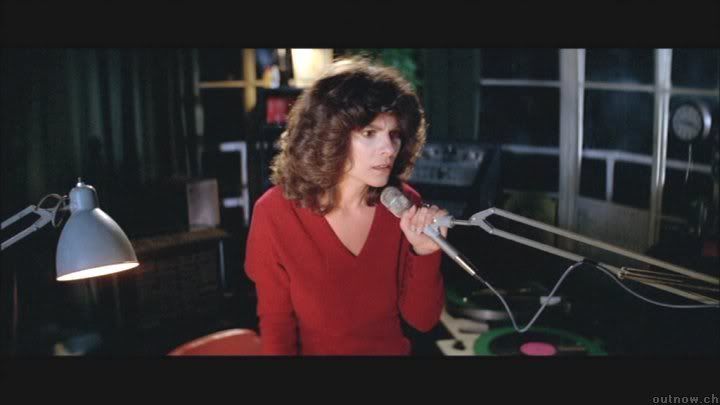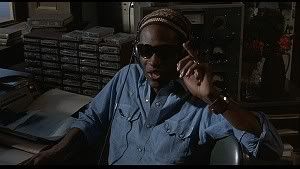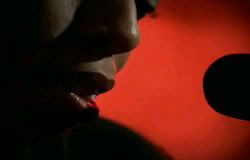Ways To Ruin Your Film: DJ Characters
There are multitudes of ways that one can totally fuck up a flick. Some are obvious, like casting the producer’s girlfriend for the lead role, but there are other ways that aren’t as obvious. These choices are sure to take the film down a notch or two in greatness. That’s what this series is about.
The Fog. Texas Chainsaw Massacre 2. Vanishing Point. The Warriors. Psycho IV. Not the worst movies ever made, but certainly not the best. There’s something that they all have in common that hindered their potential. Can you guess what it is?
They all had radio DJ characters.
A film is about spectacle. It’s action. What does a DJ do? They sit. And talk. They talk a fucking lot. You can’t even say that the set it great. It’s a table with a microphone.
There’s nothing wrong with a lot of dialogue in a film. However, even the most talkative of films set their dialogue among scenes of some interest. Kevin Smith films set dialogue-heavy scenes in retail or work environments so that the characters actually have something to do while talking. (A good example of this “business” is the scene where Jack Lemmon reveals his past infidelities to Bruce Davidson over breakfast in Altman’s Short Cuts.)
A DJ sits by their self and has a one-sided conversation.
When it comes to having a DJ character, one has a few options. One can make them an actual player in the plot or keep them on as pure commentary. Let’s look at the above-mentioned films and see how their DJs play out.
The Fog
The Fog has what is probably the best use of a DJ character in a film. This film is Stevie’s (Adrienne Barbeau) story. She’s a single mom who just happens to DJ in an old lighthouse, which just happens to give her the first views of that weird fog rolling in. She’s also among the first to learn of the fog’s malevolence, causing her to strive towards protecting her son. We actually care about her character. Although there’s too much solo yakking, but at least her job and character works in the film.
The Texas Chainsaw Massacre 2
The Texas Chainsaw Massacre 2 also takes its DJ, Stretch (Caroline Williams), and makes her a player in the events. However, the poor characterization keeps her from being worth watching. There is no character. She’s just a catalyst to get Dennis Hopper involved. If only Hopper had been involved earlier, we wouldn’t have to sit through so many boring scenes of talking to a microphone.
For all the flaws apparent in Chainsaw 2, their DJ is utilized better than in The Warriors and Vanishing Point. In these two films, the DJ acts more like a Greek Chorus telling you what you’ve just seen.
Vanishing Point
The worst of the two films is Vanishing Point and the ineptness of adding a character like Super Soul (Cleavon Little). Here we have a DJ who hears about the film’s high-speed chase on a police scanner and then just assumes that the driver, Kowalski (Barry Newman), is listening only to Super Soul’s broadcast. Quite an assumption for a DJ in a storefront radio station in some small town, but of course, he is blind, so how is he to know he works in a dump?
Super Soul proceeds to pass information to Kowalski in the broadcast. If that wasn’t bad enough, Super Soul starts to act like he has some psychic knowledge of Kowalski’s situation. At one point, the technician asks Super if he’s ready to say what he has to say to Kowalski. “I am,” Super replies, “but he ain’t ready yet.” Of course, Super Soul IS blind, and you know, the movies like for us to believe that the blind possess amazing sensory perception. Maybe Super could smell meth-popping Kowalski from two states away.
Of course, Super Soul never actually meets Kowalski, not does he ever do more than talk in a microphone. He dances like he’s having an epileptic fit for a bit, but that’s mot much better.
The Warriors
In The Warriors, the DJ is never personified. All we see is a mouth, a microphone, and occasionally a reel of tape. Here, the film at least sets up the DJ as a provider of information about the gangs over the airwaves. For us, she’s just a stylish exposition device. What keeps her from hurting the movie too much is that instead of trying to make her a player in the plot, she serves as a transitional device between the episodes in the film. It’s a nice touch, but highly unnecessary.
Psycho IV
The absolute worst use of a DJ ever is in the film, Psycho IV. This is the crappy sequel where Norman talks to a radio shrink throughout the whole goddamned movie. This DJ (CCH Pounder) is nothing more than a convenient confessional so we can endure boring scene after boring scene of Norman’s childhood. Yes, this film is set up like a clip show. Talk, flash back, more talk, more flashbacks. The DJ has no characterization.
One would wonder why the filmmakers didn’t just make a prequel instead. Of course, you wouldn’t then have the sadly-pigeonholed Anthony Perkins on the phone for 90 solid minutes.
In almost every instance, the DJ character is a band-aid of a plot device to keep things moving forward. If the film can not survive without an airwave Greek Chorus, then the script should be rewritten to work without one. A character must act and this isn’t possible talking into a microphone for scene after scene.



No comments:
Post a Comment